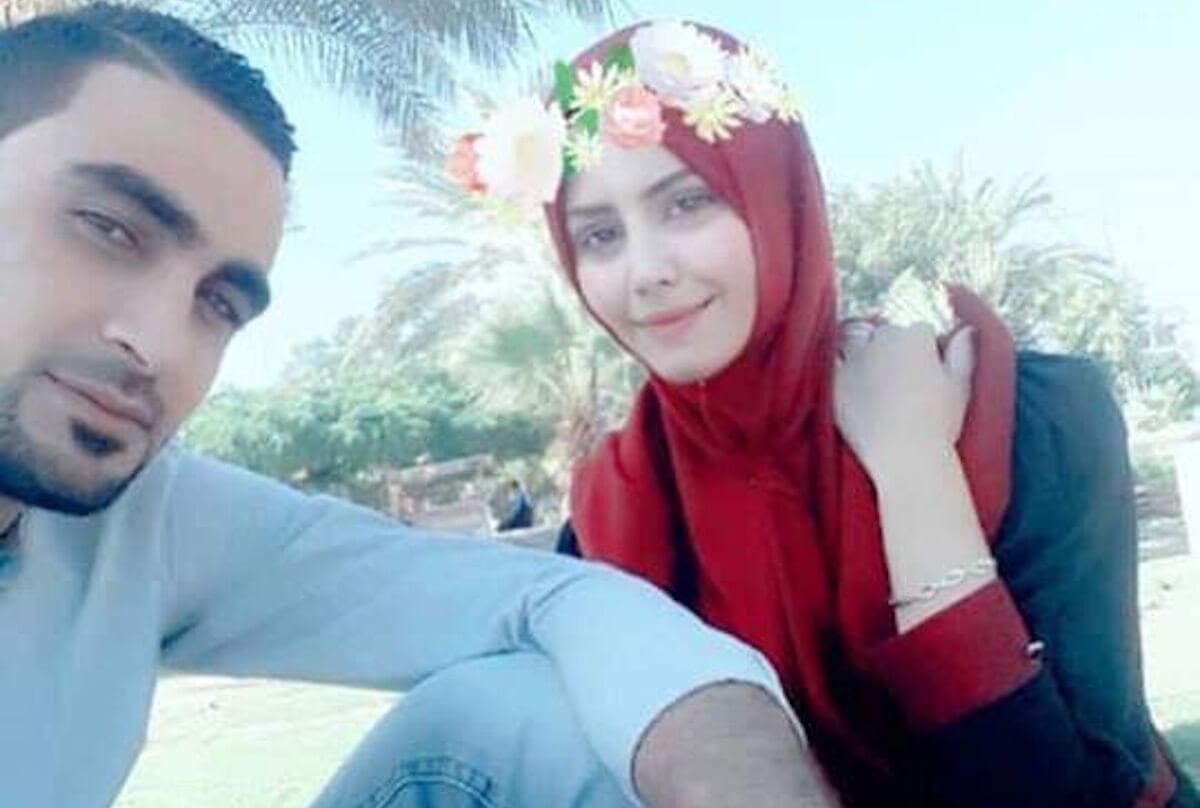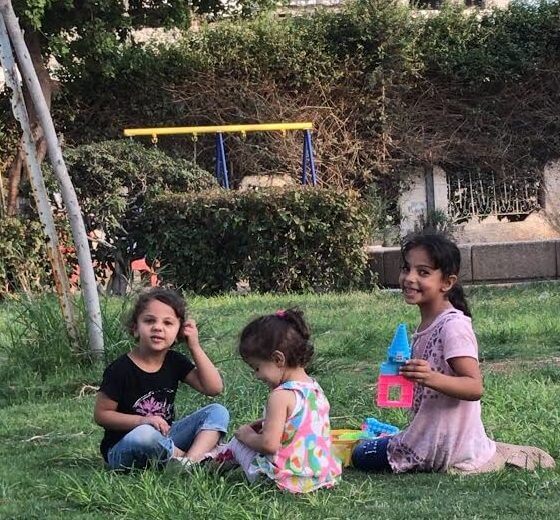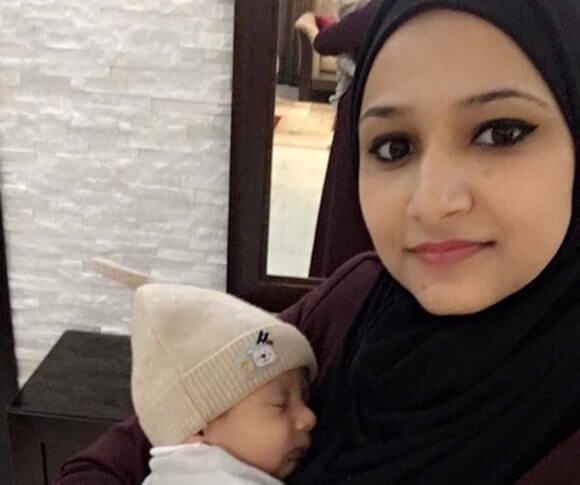I just had my first baby, a boy named Khalil, last month. From the first moment I held my child in my arms, I was flushed with emotions. I was extremely happy and blessed, but also worried and confused.
At the time I became pregnant I had a good job with an international NGO in addition to my income as a freelance writer and translator, along with my husband’s salary. Yet three months before I gave birth, my contract was terminated. The U.S. funded project I was assigned to closed as a result of the Trump’s administration cut in aid to Gaza’s relief agencies.
Suddenly I found myself about to have a new baby without security for a decent future and life. When I thought of the coming year, I could not help but think of the UN report that warns my home in the Gaza Strip will be “uninhabitable” by 2020.
But I overcame some of my worries. When I hug my son I make a choice to be happy for him. I am thankful for the blessing of having him. Still, I can only stop my anxiety for a few days at a time. When the stress returns, I wonder how I will secure a future for my son? Will we be able to provide him all his needs–a good education, good healthcare, a clean and healthy environment, a safe place to live? All these questions kept popping up in my mind and so I reached out to other new parents. Some considered leaving Gaza.
My son’s first war

Becoming a first-time mom may seem typical for a woman my age, but in Gaza nothing is typical anymore. When I decided to have a child I it was not a decision that I took lightly. I was afraid. I’m 27 and I’ve already witnessed three wars and I never want my child to experience what I’ve gone through. I live everyday in fear that a new war will take place.
Yet even with this fear, I never imagine that such a short time after giving birth my son would experience what war feels like. That is because I didn’t realistically think a war would break out when Khalil was only two weeks old when a short military escalation that took place between Israel and Hamas in mid-November. In the span of two days Israeli forces killed 15 Palestinians, and Hamas’ armed wing killed one Israeli officer. In this period Israeli soldiers bombed 150 sites in Gaza and 400 rockets were fired at Israel.
I was still recovering at my parents’ house from a caesarean delivery when the fire exchange started. It was November 11 and the first thing I did was ask my brother to move Khalil’s bed to the hallway, away from any windows in case the glass breaks in the event a building near the house is targeted.
In previous wars I was glued to my phone and laptop, writing and translating media reports. But this time I only hugged my child prayed to God to protect him from any harm. It was the first time I forgot about my own fear and only thought of him. With every incoming strike and outgoing rocket, I muffled out the sound by holding my hands over Khalil’s ears.
No stability
It’s not only the fear of war that dominates every parent in Gaza. We also lack stability. When I lost my job on July because of the punitive measures the Trump administration took against Palestinians I became like one-third of Gaza: unemployed.
My family’s ability to afford caring for our child is now in question, but it’s a question facing many parents around me.
The World Bank reported in October, “In Gaza, 54 percent of the labor force is unemployed, including 70 percent among youth,” where youth means anyone from age 15 to 29.
The potential to have a good job in Gaza seems impossible now; there’s no governmental recruitment programs because Gaza’s government already suffers from a deficit and doesn’t even pay full salaries to its employees. UNRWA is terminating employees left and right now that the Trump cuts to Palestinian refugees have hit Gaza. And, the Palestinian Authority, an employer in salary alone, is now scaling back the wages of its employees in Gaza as one of many punitive measures in the Hamas-Fatah power struggle.
I never thought of leaving Gaza before. I’m strongly committed to my family and friends here. But now, my husband and I are seriously considering leaving Gaza. We want to have a better and safer life for our child and we’ve lost trust in our politicians to do so.

Huda and her three princesses
My colleagues another journalist couple, Huda Baroud and Mohammed Othman preceded us in taking this step. Huda works as a media editor for a local media website and Mohammed used to work in investigative journalist.
Two years ago, Othman emigrated from Gaza leaving behind his wife and three daughters as he searched for a better job and to establish some himself before the rest of the family would follow.
Until now, Mohammed is in Belgium separated from Baroud and his daughters because of paperwork holds. In the meantime Baroud is suffering here in Gaza playing the role of both mother and father. We recently talked about their divided family.
“Our children are the victims we brought into this life in Gaza. We need to do our best to protect them from wars, bad living and environmental conditions,” she told me.
Huda said she now perceives that women of Gaza have become weaker after having children. There are a myriad of safety issues to worry about as a parent and it takes a toll on our strength. “I think a thousand time before I take one of my daughters to a doctor; as medical mistakes killed people here many times,” Huda said.
“Besides, with every escalation with Israel I wish if I never had children,” she said, “Gaza is not a safe place for children to grow up in, this is why I welcomed my husband’s idea of travelling abroad to search for a better life for our daughters.”
About the latest escalation, Huda went on,
“I thought about many scenarios of how I’ll escape with my daughters if a bombardment took place near our house. I tried to explain to my daughters Lamia, 6, Alma, 4, and Tulien, 2, part of the nature of the Palestinian-Israeli conflict is to understand violence impacts our lives. I wanted to make sure that if something bad happened they’re ready to face it.”
Huda tries to compensate for the absence of her husband by taking her daughters out from time to time, but the environmental pollution has made her picky and careful in her choices. She tells to me, “Going to the beach is totally forbidden because of the high pollution and wastewater.” Instead of the beach, “I brought a plastic pool for the girls to swim in inside the house.”
She’s also picky in regard to the type of food she feeds to her daughters, “I’m careful in choosing the source of vegetables and fruits the girls eat, I buy from one source that I’m sure they don’t use chemicals on plants.”
At the end of our conversation Huda told me, “I’m a journalist and I’m well aware of what’s happening here. Economic and environmental experts assured that the environmental reality of Gaza is very difficult and is about to collapse if no intervention takes place. This is why I’m always careful and picky with my daughters.”

A Crazy Step
Another couple I know, Mahmoud and Mayar Saqer, age 27 and 24, are experiencing the same emotional distress I’m having: the joy of becoming a parent along with the fear of being a parent in Gaza. The couple are about to have twins, yet instead of celebrating they are extremely worried because Mahmoud’s shoe store recently went out of business.
They are preparing themselves now to emigrate from Gaza temporarily, at least until Mayar gives birth to the twins abroad.
Mahmoud, who supports ten other members of his family, said this: “Within months I’ll be a father of two and the only source of our income has now closed. I want to immigrate to a European country so that I can guarantee that my twins will get a foreign passport and security in their future, then I’ll return to Gaza.”
The couple plans to journey along smuggling routes of thousands of fleeing refugees. First go to Egypt, then they’ll travel to Turkey, and lastly travel across the sea to Greece.
“I know that this step is surrounded with a lot of risks, but the future of our children warrants taking this risk. I want to have a better life for them,” Mahmoud said
As Mahmoud spoke I thought Malak Abu Jazar, 9, from Gaza who drowned to death off the shores of Turkey when the boat that was smuggling her family and her to Greece sunk. Mahmoud and Mayar followed the news when it broke a few weeks ago. It’s given Mayar reservations, but not enough to change her strategy. “Since I agreed to do this step, I have become very nervous,” she tells me, “I hope it goes well. The bad reality of Gaza pushed us to take this risk.”



these are really harrowing stories.
wow, i mean how do you prepare a child for that.
Meanwhile, the world is watching and learning while “Israel” panics:
https://electronicintifada.net/blogs/adri-nieuwhof/israel-enraged-french-human-rights-prize
Electronic Intifada, Dec. 14/18
“Israel enraged by French human rights prize”
By Adri Nieuwhof Rights and Accountability
EXCERPT:
“France has honored Al-Haq and B’Tselem with the prestigious Human Rights Prize of the French Republic.
“This came despite heavy pressure from Israel on the French government to pull the award from the two groups which document Israeli war crimes and abuses against Palestinians.
French justice minister Nicole Belloubet did however, give in to the pressure and refused to attend the award ceremony in Paris last Monday.
“The French Israel lobby group CRIF wrote to Belloubet alleging that the two winners ‘call for the boycott of Israel,’ and claimed that for the French justice ministry to give them the award ‘even in the absence of the minister, is insulting justice.’
“In his acceptance speech, B’Tselem executive director Hagai El-Ad characterized the Israeli government’s response as ‘hysterical.’
“El-Ad said that Israel’s attempt to pressure French officials ‘illustrates the reality within which we work: propaganda, lies, and threats by a government which believes that silencing and coverup will enable further human rights violations.’
“Al-Haq director Shawan Jabarin told The Electronic Intifada that the award is a recognition his group’s work at a time when the organization is being targeted by Israeli smear campaigns.
“The 10 December award ceremony coincided with the 70th anniversary of the Universal Declaration of Human Rights and the 20th anniversary of the UN Declaration on Human Rights Defenders.
“Furious response
“Israel reacted with fury to the announcement that France was giving the prestigious prize to the two groups.
‘France gives its highest award to B’Tselem and Al-Haq, organizations that accuse Israel of apartheid, delegitimize us internationally, defend terror and support BDS,’ Michael Oren, Israel’s deputy minister for diplomacy, claimed.
BDS stands for boycott, divestment and sanctions – a nonviolent Palestinian-led campaign to hold Israel accountable for violating Palestinian rights, modeled on the successful international solidarity movement that helped end apartheid in South Africa.
“Israel’s embassy in France tweeted it was ‘shocked’ at the award and alleged that Al-Haq is linked to the Popular Front for the Liberation of Palestine, a political party and resistance organization Israel deems a ‘terrorist’ group.
“Israeli culture minister Miri Regev said that B’Tselem and its members should feel ‘ashamed,’ describing the prize as a ‘badge of shame.’
“Israeli deputy foreign minister Tzipi Hotovely called the award ‘deplorable’ and asked the French government to reconsider.
“Hotovely claimed that Prime Minister Benjamin Netanyahu also expressed his opposition in a meeting with French President Emmanuel Macron.”